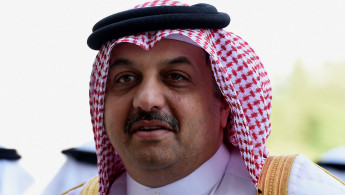Qatar's foreign minister hints at military intervention in Syria
Khaled bin Mohamed al-Attiyah, whose country supports rebel factions in Syria, did not rule out direct military intervention, along with Saudi Arabia and Turkey.
2 min read
The foreign minister defended his country's support for 'moderate' opposition groups like Ahrar al-Sham [AFP]
Qatar has no geopolitical interests or agenda in Syria, the country's foreign minister has told journalists.
"If we follow the Qatari position from day one, we have made all attempts and knocked on all doors to find a peaceful solution in Syria, but when we saw the bloodshed we had to side with the Syrian people," Khalid bin Mohamed al-Attiyah told CNN.
Attiyah said the UN Security Council was not doing enough to protect the Syrian people, so Qatar and its allies have been doing everything they can to protect Syrians, including giving support to the moderate Syrian opposition.
Qatar's alleged support for the militant Islamist group Ahrah al-Sham was also brought into focus. "They are not allies of al-Qaeda," Attiyah said. "They are a Syrian group fighting to liberate their country.
"We do not consider them extremists and terrorists," Attiyah added, saying Ahrar al-Sham was part of the "moderate opposition".
But Attiyah also refused to rule out direct military action by Qatar in Syria.
"We will spare no effort to do anything that can help protect the Syrian people and Syria from partition, with our Saudi and Turkish brethren, whatever this may be," he said. "If military intervention would protect the Syrian people from the brutality of the Syrian regime, then of course we will do it.
"The Syrian people have been fighting on two fronts, against the regime and terrorist groups, for two years. There are many ways to support them."
The Qatari foreign minister also tackled the subject of the so-called 4+1 alliance - the Syrian regime, Russia, Iran, Iraq and Hizballah.
"We have two options in the region: conflict, which we always try to avoid, and serious dialogue to resolve our problems in our region."
He added: "We do not fear confrontation, and we call for dialogue from a position of strength, because we believe in peace, and the shortest path to peace is direct dialogue."
"If we follow the Qatari position from day one, we have made all attempts and knocked on all doors to find a peaceful solution in Syria, but when we saw the bloodshed we had to side with the Syrian people," Khalid bin Mohamed al-Attiyah told CNN.
Attiyah said the UN Security Council was not doing enough to protect the Syrian people, so Qatar and its allies have been doing everything they can to protect Syrians, including giving support to the moderate Syrian opposition.
Qatar's alleged support for the militant Islamist group Ahrah al-Sham was also brought into focus. "They are not allies of al-Qaeda," Attiyah said. "They are a Syrian group fighting to liberate their country.
"We do not consider them extremists and terrorists," Attiyah added, saying Ahrar al-Sham was part of the "moderate opposition".
But Attiyah also refused to rule out direct military action by Qatar in Syria.
"We will spare no effort to do anything that can help protect the Syrian people and Syria from partition, with our Saudi and Turkish brethren, whatever this may be," he said. "If military intervention would protect the Syrian people from the brutality of the Syrian regime, then of course we will do it.
"The Syrian people have been fighting on two fronts, against the regime and terrorist groups, for two years. There are many ways to support them."
The Qatari foreign minister also tackled the subject of the so-called 4+1 alliance - the Syrian regime, Russia, Iran, Iraq and Hizballah.
"We have two options in the region: conflict, which we always try to avoid, and serious dialogue to resolve our problems in our region."
He added: "We do not fear confrontation, and we call for dialogue from a position of strength, because we believe in peace, and the shortest path to peace is direct dialogue."





 Follow the Middle East's top stories in English at The New Arab on Google News
Follow the Middle East's top stories in English at The New Arab on Google News
![Israeli forces ordered bombed Gaza's Jabalia, ordering residents to leave [Getty]](/sites/default/files/styles/image_330x185/public/2176418030.jpeg?h=a5f2f23a&itok=_YGZaP1z)

